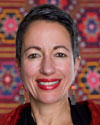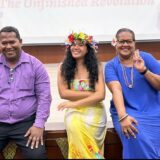Interview with Leila Hessini- II
 About Leila: Leila Hessini, originally from Algeria, is a global feminist leader and activist with over twenty years of advocacy, grant-making and organizing experience. She directs Ipas’s community engagement work, co-leads its global stigma and discrimination efforts and is a founding member of inroads (The International Network for the Reduction of Abortion Discrimination and Stigma). She serves as Chair of the Global Fund for Women board and is a member of the Women’s Global Network for Reproductive Rights and the Safe Abortion Action Fund boards. She is an advisor to the Urgent Action Fund, the Center for Women’s Leaderships’ 16th days of activism against gender-based violence and the International Museum of Women’s Muslim Women’s Art and Voices project.
About Leila: Leila Hessini, originally from Algeria, is a global feminist leader and activist with over twenty years of advocacy, grant-making and organizing experience. She directs Ipas’s community engagement work, co-leads its global stigma and discrimination efforts and is a founding member of inroads (The International Network for the Reduction of Abortion Discrimination and Stigma). She serves as Chair of the Global Fund for Women board and is a member of the Women’s Global Network for Reproductive Rights and the Safe Abortion Action Fund boards. She is an advisor to the Urgent Action Fund, the Center for Women’s Leaderships’ 16th days of activism against gender-based violence and the International Museum of Women’s Muslim Women’s Art and Voices project.
What tools and resources are inroads members developing to counter stigma?
When we at Ipas (a founding member of inroads) started investigating stigma in 2008, we found abortion stigma – unlike HIV and AIDS stigma or mental health stigma – was highly under-researched and under-theorized. With this realization we developed a conceptual framework for abortion stigma and then began incorporating questions about stigma in our community and health systems work. Through focus groups and in-depth interviews with women and men in Ghana and Zambia we sought to understand perceptions of abortions and we produced a scale – the Stigmatizing Attitudes, Beliefs, and Actions Scale – based on our findings. This tool can be used as part of a community situation assessment or as method of capturing individual or community level change.
Members of inroads have created other tools – for example, Advancing New Standards in Reproductive Health (ANSIRH) at the University of California has produced a scale to measure individual women’s experiences with stigma and Lisa Harris at the University of Michigan has developed a scale for abortion providers. These measurement tools will be a key resource to evaluate stigma intervention efforts.
Inroads also includes key scholars and thought leaders like Rebecca Cook who has examined the relationship between laws and regulations and abortion stigma, and Steering Committee member Debora Diniz who has published research about abortion stigma in Brazil.
Some network members- like Sea Change – are using book clubs to catalyze conversations about a range of stigmatized experiences like abortion, adoption, miscarriage, single parenthood, teen pregnancy, and infertility. Others like the Irish Abortion Rights Campaign launched a “myth-busting campaign this year to bring attention to the issue of stigma (http://www.abortionrightscampaign.ie/tag/8days2repealthe8th/
Other inroads members in the Latin America and Caribbean region, like Las Libres in Mexico, are developing accompaniment models of support for women by providing in-person and SMS text message psychosocial support to help mitigate the isolating impact of abortion stigma, as well as to help women access to misoprostol.
In the United States, members are harnessing the power of storytelling, which is grounded in the theory that interpersonal contact can help reduce stigma, judgment and discrimination. The 1 in 3 Campaign, The Abortion Diary Podcast, the Abortion Conversation Project, My Abortion My Life, are just a few of these.
There are key projects around the globe that are supported by network members such as IPPF, Ibis and the Sea Change Program to develop and test abortion stigma reduction interventions for women and young women at different levels. Through inroads, we hope to be able to share ong0ing lessons learned, and ultimately results around what works to understand, mitigate, challenge and, ultimately, eradicate abortion stigma.
What are the lessons learnt?
One of the most important lessons that we have learned is that while abortion stigma may seem inherent or insurmountable, in fact it is not. Abortion stigma has been created to control women but we can envision and create a world where women are affirmed and supported, not judged and devalued. This, perhaps, is the most empowering thing we can understand as advocates. Already some progress has been made to support stigma-reduction efforts around the world and to build a global community of scholars, health providers and advocates working to understand, mitigate and challenge abortion stigma.
Another key lesson for the global reproductive justice and reproductive health communities is to intentionally examine our language and practice around abortion to ensure that we are not inadvertently stigmatizing certain groups of women. At Ipas, we have used the opportunity to think more deeply about the language we use and the stories we choose to tell and are being more intentional about not valuing some abortions over others. This means understanding and respecting women’s decisions and not privileging early abortions over late, those of married women over adolescents, or those of women who can afford to pay for services versus those who can’t.
A third lesson is that we need a broad-based movement for real, sustainable social change around stigma to exist. To ensure global and regional representation in the network, we conducted an open call for a Steering Committee and have selected members from Pakistan, Brazil, Senegal, the U.K. and the United States who will provide strategic direction for the network and will lead working groups to further a learning and action agenda for abortion stigma. And we will issue a call for small grants for member organizations developing and testing innovative approaches to addressing stigma in the near future.
We know there is a lot of interest and activity around the world in understanding, mitigating and ultimately challenging abortion stigma. Inroads is helping share information, tools and resources; raising awareness about abortion stigma with diverse audiences; supporting coordination among members; facilitating learning from promising practices and other fields; and ultimately strengthening capacity and developing resources for abortion stigma work.
What do you have to say about Abortion Stigma being adopted as a global theme for 28th September which is international day of action for access to safe and legal abortion?
I’m thrilled that inroads is partnering with WGNRR and the International Campaign for Women’s Right to Safe Abortion in focusing this September 28th Global Day of Action on abortion stigma! It’s so great to see abortion stigma recognized as global issue that activists around the globe are mobilizing around. We all have a role in supporting a global shift in how we think of abortion and I love the idea that Stigma Ends With Us! We as advocates need to reflect on our own contribution to stigma, and how we may be experiencing, creating or perpetuating it in the language we use and the women’s stories we tell. Let’s deconstruct what we’ve learned and create something different. Let’s aspire toward a world where women’s rights are upheld, fully and without conditions or exceptions!
It’s not too late for you to join this effort. For ways to get involved, please visit http://www.september28.org/world-free-of-abortionstigma/.
Learn more about inroads:






